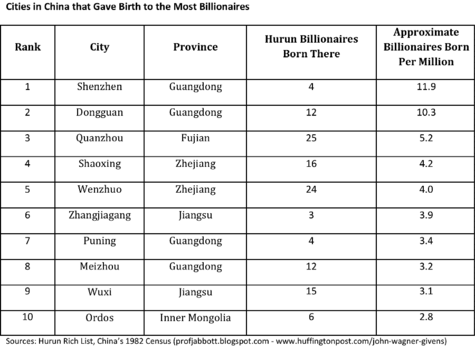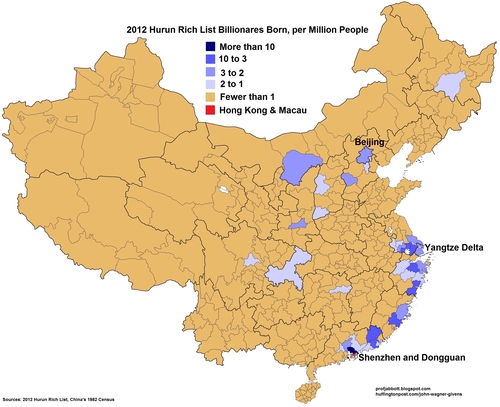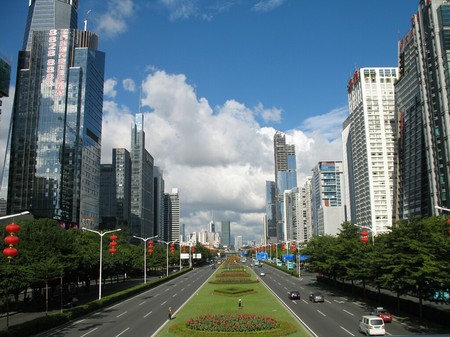Judging from coverage of the Bo Xilai scandal and the recent New York Times expose on the "Hidden Riches" of the family of China's Prime Minister, Wen Jiaobao, the Anglophone media seems to have acquired a sudden interest in the wealth of China's political class. The story of how China's political elites have been able to leverage their power to make a quick RMB is alluring, but it is also important to keep this in perspective and remember that most of China's richest owe their success to their distance from, rather than their connections in, Beijing.
For the most part, China's billionaires are not from Beijing. Instead, they probably come from the same place as the clothes on your back, the shoes on your feet and the gadget you are reading this on. In other words, they are those lucky enough to have been born in the cities that became centers of manufacturing and development in China's export-driven boom. The table below shows the cities in China that gave birth to the most billionaires per capita, using population in 1982 (since most Chinese billionaires were born in the 50s and 60s and it is impossible to get reliable figures from any earlier).
The figures are truly staggering. One out of every 83,788 people born in Shenzhen by 1982 ended up among China's richest 1,000. But, what made some regions of China into such fertile ground for growing billionaires?
Obviously, most billionaires sprung up in places where development got an early start. Just as owning a farm on what would become midtown Manhattan propelled the Roosevelt family to generations of wealth and power, entrepreneurs in Shenzhen and Dongguan had the unprecedented advantage of opening factories on farmland that would give way to skyscrapers within a couple of decades.
There are some billionaires who made their fortunes in other ways, such as natural resources, and this explains why Ordos, a center of mining operations, is on the list. But most Chinese billionaires owe their prosperity to property and/or manufacturing, with some service industries, such as hotels and I.T. also represented. The trick was to make a small fortune quickly, in export-oriented manufacturing for example, and then invest it in an economy that was growing around 10% a year and thereby turn it into a gigantic fortune.
As can be seen from the map above, the strategic location of many of these cities, on the coasts at the mouth of navigable rivers, helped jump-start their development, but it was their relative remoteness from Beijing that gave them the opportunity. Traditionally, Guangdong and Fujian were poor backwaters, but because of this, for over a century they had been important points of emigration and many of these émigrés returned to provide scarce and vital expertise and capital to their hometowns in the beginning of the reform era. The Yangtze River Delta (Zhejiang and Jiangsu), by contrast, had been China's most economically vibrant region for a millennium, but because Mao had moved investment away from the coasts for fear of invasion, private firms in these regions did not have to compete with or worry about interference from state-owned behemoths.
Because these regions were poised for export manufacturing, but were not considered particularly political strategic, Deng Xiaoping and the Communist Party were willing to allow early experiments with capitalism, beginning in Shenzhen and Dongguan, right across the border from Hong Kong. Then, moving up the coast to Fujian and the Yangtze Delta, they allowed for the creation of Special Economic Zones and Coastal Development Areas which provided a reprieve from the onerous regulations that protected state-owned industry and impeded development closer to Beijing.
In other words, it was the fact that these regions were neglected by Beijing that allowed them to get an early start and propel so many of their native sons and daughters to billionairehood. Yet these places are no longer backwaters; nine out of Dongguan's twelve billionaires are still there, while only one has moved to Beijing.
Of course, many of these billionaires now have political connections, but, like China's richest man, Zong Qinghou, who was earning $8 a month selling popsicles only 25 years ago, their luck came from being in the right place - far away from Beijing - at the right time.



